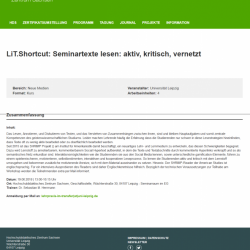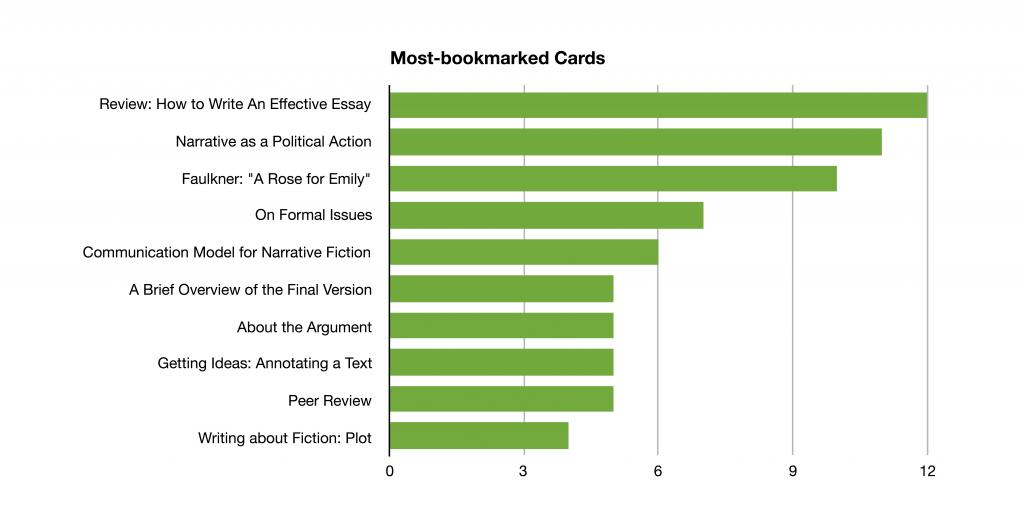SHRIMP beim LiT.Shortcut
 Submitted by smh on
Submitted by smh on
Am 19. Juni wurde SHRIMP im Rahmen eines LiT.Shortcut interessierten Lehrenden vorgestellt. Unter dem Titel ...

Limit access to the author
 Submitted by smh on
Submitted by smh on
Am 19. Juni wurde SHRIMP im Rahmen eines LiT.Shortcut interessierten Lehrenden vorgestellt. Unter dem Titel ...

 Submitted by smh on
Submitted by smh on
Am 25. Mai haben wir das SHRIMP Projekt bei einem Didaktik-Workshop im Rahmen der Jahrestagung der Deutschen Gesellschaft für Amerikastudien (DGfA) präsentiert. Ca. 30 Teilnehmende, überwiegend FachdidaktikerInnen, Lehrerinnen und Lehrer und interessierte Mitglieder der DGfA, nahmen die Präsentation zum Thema “Questioning the Authority of the Linear Form?
 Submitted by Natalie Bühler on
Submitted by Natalie Bühler on
After the conclusion of the #readingsforthebreak, which we took from the Literature and Culture I-list of exemplary texts for each period, we thought it’s time for some statistics. We had some thought provoking conversations about diversity and representation regarding our reading recommendations and this prompted us to take a closer look at the canon, so here it is: #talkcanontome! We have six periods to look at, so let’s dive into it!
 Submitted by Natalie Bühler on
Submitted by Natalie Bühler on
This Thursday, the instagram account of the University of Leipzig featured a special guest: Shrimpy! In a series of photos uploaded to their story, a feature that allows for a sequent of posts to disappears after 24 hours, viewers gained an insight into what a day with Shrimpy looked like. Starting with getting up:
 Submitted by Natalie Bühler on
Submitted by Natalie Bühler on
This week in Talk Nerdy to Me, we will be discussing a lesser known feature on SHRIMP: bookmarks. They’re a great way to keep in mind cards that might be interesting or important in the future, but also to make sure you remember where you read something important for the next session. Let’s take a look at how you all have been using this function and which cards have received the most bookmarks:
 Submitted by Natalie Bühler on
Submitted by Natalie Bühler on
This week in Talk Nerdy to Me, we’re going to look at the reading questions – that neat feature that pops up at the end of sessions, asking you to reflect on what you read and to put it into your own words. Reading questions help you get organized for the seminars as they test whether or not you truly understood what you read, and prepare you for discussing the texts with your peers. While this feature has been steadily used by you all, we can detect quite a bit of fluctuation when we look at the data:
 Submitted by Natalie Bühler on
Submitted by Natalie Bühler on
Diese Woche bei “Talk Nerdy To Me“ schauen wir uns die verschiedenen Lerntypen an, die auf SHRIMP zu finden sind. Da es allerlei verschiedene Möglichkeiten gibt, auf SHRIMP mit dem Text zu interagieren – Kommentare, Likes, Annotationen – ist es ganz interessant zu sehen, wie diese Funktionen genutzt werden. Diese Woche analysieren wir, wie viele private Annotationen pro Person in einem Semester gemacht werden. Dazu haben wir den Datensatz des Wintersemesters 15/16 genutzt um ein Diagramm zu erstellen:
 Submitted by Natalie Bühler on
Submitted by Natalie Bühler on
Wie bereits angekündigt, dreht sich in dieser Projektphase von SHRIMP alles um Learning Analytics, also die Auswertung von Nutzungsdaten der Plattform. Um dem statistikgeneigten SHRIMP-Leser unsere Erkenntnisse nicht vorzuenthalten, gibt es hier ab jetzt das wöchentliche Installment "Talk Nerdy to Me" zu lesen, in welchem wir unserem inneren Statistik-Nerd frönen.
Diese Woche liegt unser Fokus auf der Anzahl Karten, die pro Tag gelesen wurden:
 Submitted by Natalie Bühler on
Submitted by Natalie Bühler on
 Student!, die Hochschulzeitung der Universität Leipzig, hat ihm Rahmen eines Artikels rund um die Digitalisierung an Hochschulen über SHRIMP berichtet. Im Fokus stand dabei, wie die Plattform funktioniert, und welche Erfahrungen Studenten mit den zahlreichen Features gemacht haben.
Student!, die Hochschulzeitung der Universität Leipzig, hat ihm Rahmen eines Artikels rund um die Digitalisierung an Hochschulen über SHRIMP berichtet. Im Fokus stand dabei, wie die Plattform funktioniert, und welche Erfahrungen Studenten mit den zahlreichen Features gemacht haben.
 Submitted by smh on
Submitted by smh on
Im Wintersemester 2017/18 beginnt eine neue Projektphase für SHRIMP! Mit Hilfe einer Förderung des SMWK im Rahmen des AK E-Learning des HDS wollen wir nun die Potenziale von Learning Analytics weiter erforschen. Unter Learning Analytics versteht man die Nutzung von Metadaten zur Verbesserung der Lehre. Details zu dieser Projektphase finden sich unter www.shrimpp.de/analytics.